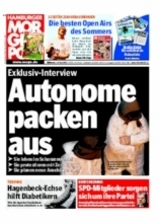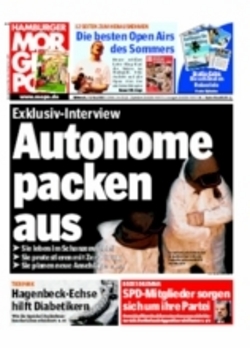
2007-05-28
I would like to give you a short roundup of a discussion which is at the moment taking place in german press before the g8. I think that press coverage is an important factor to the success of the summit. Reading the international press, this discussion is not being reported outside Germany. I guess the last information on this list about the current situation in Germany - were the mails about the raids and the demonstration ban. Here some more information besides this.
The growing repression against the G8 protests shows astonishing results. Instead of applauding the actions of the states most parts of the liberal and left press bring almost each day an article on the repression against the protest and sometimes criticizing heavily the police's/state's policies and actions as not adequate and breach of constitutional rights, creating a general mood more positive towards the protest than towards the police.

It all started with the raids. The press first was applauding, but from the second day on they started criticizing the action and making fun of it (as some of the searched were 60+ and as others had been informed beforehand about the repression and as some part of the raid aimed at the publishers of a book which has been published for already five years). Later on some newspapers were starting to question the need for those raids and the aim of it. Was it to frighten? (which they criticized as anti-democratic). And thanks to the press the raids show results which haven't been expected. Strenghtened by the press, as they claim that the raids strengthen the protest, the protest is strengthened, like a self-fulfilling prophecy.
Another thing which made the press think was, that nobody was arrested. They are asking. If those people are really dangerous terrorists - why let them run around freely - if they are not dangerous, why those raids?
The second step was, that the minister of interior Wolfgang Schäuble (Christian conservative party) announced, that protesters might be arrested preventively/preemptively. There came a second outcry in the press - as this affects the right to demonstrate, which is officially a basic right in the German constitution.
The third step was the ban of the demonstration around Heiligendamm and the airport Rostock Laage. A new outcry followed. Referring to a court decision of the high time of the protest against construction of nuclear power plants (which granted demonstrators the right to demonstrate in audible/visible distance to the addressee of the protest), large parts of the liberal press defended the right of demonstration (some even said, that this right has to be granted, even if violence can be awaited).
The fourth bigger thing was the news that the German police took from some of the raided odor-samples. This caused another outcry, as this is a method which has been used by the Stasi (the GDRs intelligence apparatus - known now e.g. by the movie: Das Leben der Anderen - The lives of others). Some politicians now started to compare the means of the policies with those of the Stasi (which is a strong accusation in Germany) and some newspapers followed.
And just today newspapers announced that the police has been opening letters to find 'claims of responsibility' after some more fires had been burning cars). This is also heavily attacked, as the privacy of correspondence is also an 'untouchable' right of the German constitution.
All those news are seen just as a further part of the legislations which have been passed as anti-terrorist laws since the 70ies and again stronger after 9/11. As for example online raids of computers, a central data base of fingerprints...
All together those news create now an atmosphere which helps the protest on one side, as people are now sympathizing with the protest, in order to defend 'democratic liberties'. The problem of this support is: nobody is really talking about the contents of the protest anymore, why are we against, why demonstrating - this is not as important to the press at the moment, as the question: are we still living in a democracy?
Therefore the manifestation on the second might be in large parts also a demonstration against the state repression and against a police state.
But the positive effect of the press coverage are:
- the press is regarding the protest rather positively, which is supported by a rather press work from the protest (though they very often also mention, that this is only for the peaceful protest, but there is no real gauntlet for the more radical parts)
- the press tries to understand why people are demonstrating and doesn't create as much, as during other summits, the picture of barbarians destroying everything, and instead give space to some protesters to express themselves
- the discussion about violence from demonstrators is not in the center. the press rather criticizes the police actions and the police's efforts to criminalize the movement or to divide it shows no results (though i don't know whether this is a result of the press coverage, or of the long collaboration of large parts of the movement)
- several papers claim that the police is escalating and fear another Genoa (but now seeing thereby the Genoa riots rather as a response to police escalation)
The above described is mostly spread by supra-regional papers of liberal or left orientation mostly read by intellectuals in larger cities. for sure, not all articles are positive, but above written in my opinion describes the basic tenor of the discussion.
To the region around Heiligendamm:
I can't really tell how it is in the region of the protest. This region is the hindmost German province where people never have been facing such a big protest and are partially extremely frightened by it, whereas the police helps to create fears.
Maybe somebody living in the region can write some lines about the sentiments / mood there.
[http://de.indymedia.org/2007/05/178706.shtml]

